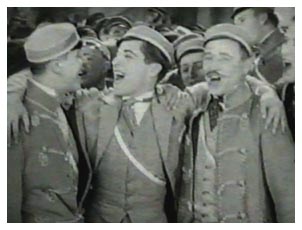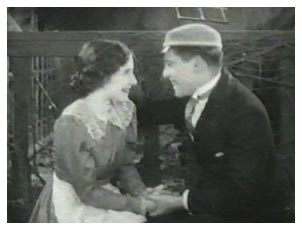

Distributed by Metro-Goldwyn-Mayer
Directed by Ernst Lubitsch
New York Premiere September 21, 1927
Cast: Ramon Novarro (Prince Karl Heinrich), Norma Shearer (Kathi),
Jean Hersholt (Dr. Juttner), Gustav von Seyffertitz (King Karl
VII), Philippe de Lacy (Heir Apparent), Edgar Norton (Lutz), Bobby
Mack (Kellerman), Edward Connelly (court marshal), Otis Harlan
(Old Ruder), John S. Peters and George K. Arthur (students)
Please indulge me if I begin a review of a silent film by bringing in a song from a Lerner and Loewe musical. If you love My Fair Lady (and who doesn't?), consider the moment when Freddy Eynsford-Hill professes his love to Eliza Doolittle, larding on the clichéd words of the smitten swain. Cutting his loquaciousness short, Eliza let him have it (go right ahead and youtube Julie Andrews' crystalline voice here):
Any silent film aficionado will smile at those lines blasting words in all their uselessness-and yes, we can bring in Norma Desmond for support. But what animates this lovely song is an eagerness to grab life with both hands, a hunger for love in all its immediacy. Put colloquially: give it here, and right now!!
There you have the heart of Ernst Lubitsch's The Student Prince in Old Heidelberg (1927), which shares a similar storyline with the 1924 Rudolph Fryml operetta, and in David Shipman's view, is "[a]lmost the oldest musical comedy plot of them all. This version [doesn't] have songs or even speech, but the direction by Lubitsch compensate[s]-and indeed makes it preferable to the 1954 version."
You likely know the story: young Karl Heinrich (Ramon Novarro), heir apparent to the throne of a musical-comedy Germany, is sent to Heidelberg to complete his education. There he falls in love with a commoner, the lovely barmaid Kathi (Norma Shearer). Duty and Heart's Desire meet head on, and given that the story is set in the early twentieth century, you can guess which comes out ahead.
The Student Prince is in some ways a film tinged
with deep sadness, for it's essentially a story of isolation imposed
by rank, tradition, age, propriety, fear, and death. The film
is dominated by walls, doors, gates, iron railings,
vast spaces, and cramped spaces, behind and within which our characters
long for what once was, what might be, or what never will be.
Some of these moments of longing do have a sweet redemption: in
one scene, when Karl Heinrich exultantly joins his newfound student
friends in song in a Heidelberg beer garden, his longtime tutor,
Dr. Juttner (a beautiful and tender performance by Jean Hersholt),
initially is unable to sing, so overcome is he with nostalgia
for his own youth. Sensing his mentor's wistful melancholy, Karl
Heinrich goes to him and throws his arm about the older man's
shoulders, bucking him up, and the two raise their voices with
the crowd. Rescuing what might have been another reminder of separateness,
it's a lovely, soaring moment of friendship.
by walls, doors, gates, iron railings,
vast spaces, and cramped spaces, behind and within which our characters
long for what once was, what might be, or what never will be.
Some of these moments of longing do have a sweet redemption: in
one scene, when Karl Heinrich exultantly joins his newfound student
friends in song in a Heidelberg beer garden, his longtime tutor,
Dr. Juttner (a beautiful and tender performance by Jean Hersholt),
initially is unable to sing, so overcome is he with nostalgia
for his own youth. Sensing his mentor's wistful melancholy, Karl
Heinrich goes to him and throws his arm about the older man's
shoulders, bucking him up, and the two raise their voices with
the crowd. Rescuing what might have been another reminder of separateness,
it's a lovely, soaring moment of friendship.
But consider an earlier moment of connection, one that paves the way for the exultant middle of the film. Having just passed his high-school examinations, Karl Heinrich trembles with fear, thinking that he and Dr. Juttner now will be separated forever, whereupon Juttner informs him that the two are soon to be on their way to Heidelberg. Seating himself upon a footstool before Juttner, Karl Heinrich remains without a clue: what's there? Juttner bends down and whispers in Karl Heinrich's ear. We're not told what he says, but we can see Karl Heinrich's face: interest, then incredulity, then an ear-to-ear as he hugs his knees with delight -- an example of the famous Lubitsch touch that makes the viewer grin: never full court press, but wink, innuendo, suggestion, nudge. Let the viewer's imagination do the rest, and it does - oh, does it ever.
Want another example? Take the first meeting between Karl Heinrich and Kathi, after she's presented him with flowers and a poem. As he talks with the owners of the inn where he'll stay, she looks him over from the front, then goes to the rear and looks him over again, then goes back up front for another once over, her eyes doing pushups and her smile growing. Whoo, this stud muffin looks good! Once she takes him through the inn and shows him his room, she demonstrates the couch ("You can sit on it!") and then goes to the bed, proving its softness by perching on a corner of the mattress and bouncing, bouncing, bouncing. She isn't thinking anything. We're thinking plenty. Karl Heinrich clearly is, too, for in his mortification and delight, he's looking everywhere but the bed. Oh la la.
He's smitten. And a few minutes later, in one of the best scenes in the film, he gazes from his window into the courtyard below, watching as students hoist their steins, put their beloved Kathi on their shoulders and parade her around, reveling in the joys of springtime and laughter. Inflamed with desire for Kathi, springtime, and laughter himself, he takes a drink of water and puts it down with disgust: water! He cuts a weensy slice of the pound cake Kathi has made for him and takes a nibble. Mm. He takes a bigger bite. Yumsy tumsy! He wolfs down the remainder and cuts a Dagwood-sized slice this time. Heaven! And within a minute, he flings open his door and is on his way to the courtyard. Enough of vicarious living; show me!
You need to see for yourself what comes next. Oh, you know
there'll be dances, kisses under starlight, rowboat rides, silly
gifts, carriage races through the streets, laughter, moments of
shyness, more moments of cutting up-all in keeping with the euphoria
of youth and love itself, when possibilities are endless and if
and but are words no one's ever heard of. It's truly
one of  the sweetest portrayals of love's
exuberance ever put on film, helped here beyond measure by Carl
Davis's score, filled with lilting waltzes and violins heavy on
the vibrato and heartstrings. I love his scores for Napoleon,
The Crowd, The Four Horsemen of the Apocalypse, and Ben-Hur,
but this one may be my favorite, hoisting love's golden enchantment
into the empyrean.
the sweetest portrayals of love's
exuberance ever put on film, helped here beyond measure by Carl
Davis's score, filled with lilting waltzes and violins heavy on
the vibrato and heartstrings. I love his scores for Napoleon,
The Crowd, The Four Horsemen of the Apocalypse, and Ben-Hur,
but this one may be my favorite, hoisting love's golden enchantment
into the empyrean.
Both Novarro and Shearer are superb throughout the entire film. I'll confess that the intelligent and surprisingly adaptable Shearer has always been one of my guilty pleasures. She divides viewers, I know (critics, too: Pauline Kael, who generally couldn't stand her, granted that one of the attractions of MGM's 1931 version of Private Lives was "Shearer's acting halfway human for a change"), but the emotional tremulousness that occasionally could spill over into bathos is under firm control here, and she plays her lighter scenes with a pixieish sense of fun. Gavin Lambert, in Norma Shearer: A Life, tells us that this effervescence sailed forth only after a battle royal:
The first week of shooting was bumpy. Norma had never worked before with a director who refused to let actors rehearse at length and in detail because he believed it made them less spontaneous. She also disliked his technique of acting out a scene, then expecting her to imitate him. By now she had fixed her own approach to a role, which was to immerse herself completely in it until she felt secure. Lubitsch's method gave her no time to reach this point of security; the result was a tantrum and a phone call to [Irving] Thalberg, asking him to come over to the set. He listened to both sides, then quietly told Norma that "everyone has a lot to learn from Mr. Lubitsch."
Tactful and typically shrewd, the comment implied that
Norma was not flexible enough and risked becoming a prisoner of
habit. She took the point, stilled her sense of caution, liberated
her sense of adventure, and proceeded to give one of her finest
silent movie performances in one of the director's best silent
movies. "I flatter myself I opened a door for her,"
Lubitsch said.
Novarro may be even more of a revelation here than Shearer. Anyone
seeing his virile and even majestic Ben-Hur two years before would
never predict that he'd bring such wide-eyed ingenuousness to
his Karl Heinrich for the first half of the film. Later called
upon to internalize the tension between love and duty, he plays
only with his large, dark eyes, and he's pitch perfect: desperation,
loyalty, and resignation are suggested only with brushes, not
sweeps. Unlike Shearer, whose beautiful voice was so right for
her patrician face, Novarro really did not have intonation suited
to his leading-man image: his playing against Garbo in Mata
Hari (1931) and Jeanette MacDonald in The Cat and the Fiddle
(1934) sounds fey and pallid. But the more of his earlier work
I see, the more Novarro emerges as one of the finest actors of
the twenties.
Reading over this commentary, I see I've described The
Student Prince in Old Heidelberg only elliptically, leaving
much to your imagination. Brushes, if you will, rather than sweeps.
It's deliberate, for I want you to see this wonderful film. Check
the TCM schedule, go to Netflix, check Amazon.com and wave the
printout under your sweetie pie's nose. My students in Silent
Film have been enchanted. You will be, too, for the simple story,
the Lubitsch touch, the Davis score, and Shearer and Novarro.
There are times when I think this picture the perfect introduction
to the art of silents, times when I wax rhapsodic about it to
my friends; and I love the look on their faces, saying not in
challenge, but in eagerness: show me.
Copyright 2013 by Dean Thompson. All rights reserved